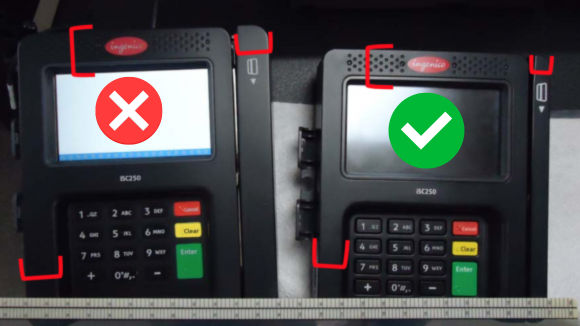Shapiro Administration Reminds SNAP Recipients to Change EBT Card PINs Ahead of Monthly Distribution to Prevent Theft of Benefits
To protect their benefits, SNAP recipients should change their PIN every month and ensure skimming devices are not attached when swiping their cards.
The Department of Human Services (DHS) and the Office of State Inspector General (OSIG) today are reminding Pennsylvanians who receive Supplemental Nutrition Assistance Program (SNAP) benefits to change their EBT card PINs ahead of their monthly SNAP benefit distribution. This reminder is extremely timely, as thieves often strike right after a monthly benefits payment is made.
The reminder comes amid nationwide instances of SNAP theft, especially reports of card skimming, where SNAP benefits are stolen off EBT cards after skimming at a point-of-sale machine. But the actual theft of benefits rarely happens right away – thieves often hold on to stolen EBT card information until monthly distributions occur, when larger amounts of benefits can be stolen.
“We are constantly working to ensure that the benefits DHS administers stay with the Pennsylvanians who need them. The Department of Human Services is aware of skimming incidents that have been targeting SNAP recipients – card skimming and SNAP theft have been issues nationwide,” said DHS Secretary Dr. Val Arkoosh. “Do not become a victim of this crime. Make sure you change your PIN every month, and when you swipe your EBT card at a card reader, please make sure a skimming device is not attached.”
DHS refers suspected cases of SNAP theft to OSIG to further investigate.
“OSIG is hard at work investigating instances of skimming across Pennsylvania and prosecuting the criminals involved,” said State Inspector General Michelle Henry. “We urge Pennsylvanians to remain diligent and follow the steps outlined here to protect their SNAP benefits from skimming. As part of our ongoing investigations, OSIG agents have identified and removed skimmers from grocery stores and will continue to work closely with DHS and local law enforcement to protect the integrity of these vital programs.”
How to Change Your EBT Card PIN
SNAP recipients are encouraged to change their EBT PIN at least monthly and right before their payment date to prevent theft. SNAP benefits are issued onto EBT cards monthly, and the issuance schedule for SNAP benefits varies by county.
SNAP recipients can change their EBT card’s PIN:
- By Phone: DHS' EBT Recipient Hotline is available at 1-888-EBT-PENN (1-888-328-7366) and is open 24 hours a day, seven days a week.
- Online: Users can change their PIN online through DHS’ EBT contractor, Conduent, via their Connect EBT website.
- Via Mobile App: Users can also change their PIN online through two separate apps:
- Conduent’s secure ConnectEBT app, available for free on Apple and GooglePlay app stores.
- DHS’ myCOMPASS PA mobile app, Pennsylvania’s official, safe, and secure mobile app, available for free on Apple and GooglePlay app stores. SNAP recipients can also monitor their SNAP benefits and transactions regularly through the myCOMPASS PA mobile app.
DHS has implemented enhanced EBT card PIN security in response to these skimming incidents, such as prohibiting simple passwords like 1234. DHS is working with its EBT contractor and the USDA's Food and Nutrition Service (FNS) to evaluate options to further enhance EBT security in the future, including allowing users to lock their cards via the ConnectEBT app.
Prevent Card Skimming
Pennsylvanians are urged to take an extra look before swiping their card at a point-of-sale machine to ensure there is no skimming attachment.
Retailers must also remain vigilant and be responsible for the removal of skimming devices in order to protect their customers.
Skimming devices, often called skimmers, are designed to blend in and deceive customers, but there are ways to identify a fraudulent device:
- Observe the size. Skimming devices are often placed over the legitimate card reader, making them larger and thicker than legitimate card readers.
- Skimming devices are often attached with glue or tape.
- Pull at the edges of the keypad before entering your PIN.
- Look for security stickers. Some legitimate devices may have a security label or holographic decal on the front or top of the card reader.

The image above shows the slight differences between a skimming device and legitimate card reader. The device on the left is a skimmer. The edges are larger than the legitimate device shown on the right. These subtle differences are designed to trick consumers.
If a customer finds a skimming machine at a point-of-sale, they should immediately alert the retailer and should also call law enforcement and the OSIG Public Benefits Fraud hotline at 1-800-932-0582.
OSIG outlines ways to prevent SNAP theft on its website, including ways to recognize card skimmers. The FBI also provides additional skimming prevention information and graphics on skimming attachments on its website.
Report Stolen Benefits and Request a New EBT Card
If SNAP benefits are stolen from an EBT card, that theft should be immediately reported to local law enforcement and to OSIG by calling 1-800-932-0582.
If an individual's benefits are stolen, they should request a replacement EBT card as soon as possible from DHS’ EBT contractor, Conduent, at 888-328-7366, or by contacting their local County Assistance Office. Card replacement fees are waived when electronic theft is reported.
Due to the end of Congressional authorization of funds to replace stolen benefits, benefits stolen after December 20, 2024, cannot be reissued by DHS.
Find Immediate Food Assistance
SNAP benefits are issued onto EBT cards monthly. For immediate food needs, Pennsylvanians can call 211 or visit www.pa211.org to connect with various local food resources and can also visit www.feedingpa.org to find local food banks and other food assistance programs. Individuals in need can also visit pa-navigate.org/ for help finding food and other resources and assistance.
DHS has more information about skimming on our scams page, and the federal USDA's Food and Nutrition Service also has additional information on its webpage.